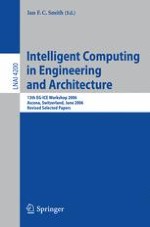2006 | OriginalPaper | Buchkapitel
A Decentralized Trust Model to Reduce Information Unreliability in Complex Disaster Relief Operations
verfasst von : Dionysios Kostoulas, Roberto Aldunate, Feniosky Peña-Mora, Sanyogita Lakhera
Erschienen in: Intelligent Computing in Engineering and Architecture
Verlag: Springer Berlin Heidelberg
Aktivieren Sie unsere intelligente Suche, um passende Fachinhalte oder Patente zu finden.
Wählen Sie Textabschnitte aus um mit Künstlicher Intelligenz passenden Patente zu finden. powered by
Markieren Sie Textabschnitte, um KI-gestützt weitere passende Inhalte zu finden. powered by
The vulnerability of urban areas to extreme events is a vital challenge confronting society today. Response to such events involves a large number of organizations that had no past interactions with each other but are required to collaborate during disaster relief efforts. Participants from diverse teams need to form an integrated first response group to effectively react to extreme situations. Civil engineers are expected to play a key role in collaborative first response groups, because of their structural expertise, as complex disasters in urban areas are usually followed by structural damage of critical physical infrastructure. The establishment of trust is a major challenge in extreme situations that involve diverse response teams. Although the means of communication are available (e.g., ad-hoc networks), first responders are hesitant to interact with others outside of their organization because of no prior experience of interactions with them. Moreover, the spread of inaccurate information in cases of complex disaster relief operations increases uncertainty and risk. Participants must be given the ability to assess the trustworthiness of others and information propagated by them in order to enforce collaboration. In this paper, we propose a decentralized trust model to reduce uncertainty and support reliable information dissemination in complex disaster relief scenarios. Our model includes a distributed recommendation scheme, incorporated into an existing membership maintenance service for ad-hoc networks, and a nature-inspired activation spreading mechanism that allows trust-based information propagation. To evaluate the effectiveness of our method in reducing information unreliability in complex disaster areas, we tested it through software simulations and by conducting a search and rescue exercise involving civil engineers and firefighters. Results indicate fast and robust establishment of trust and high resilience to the spread of unreliable information.
